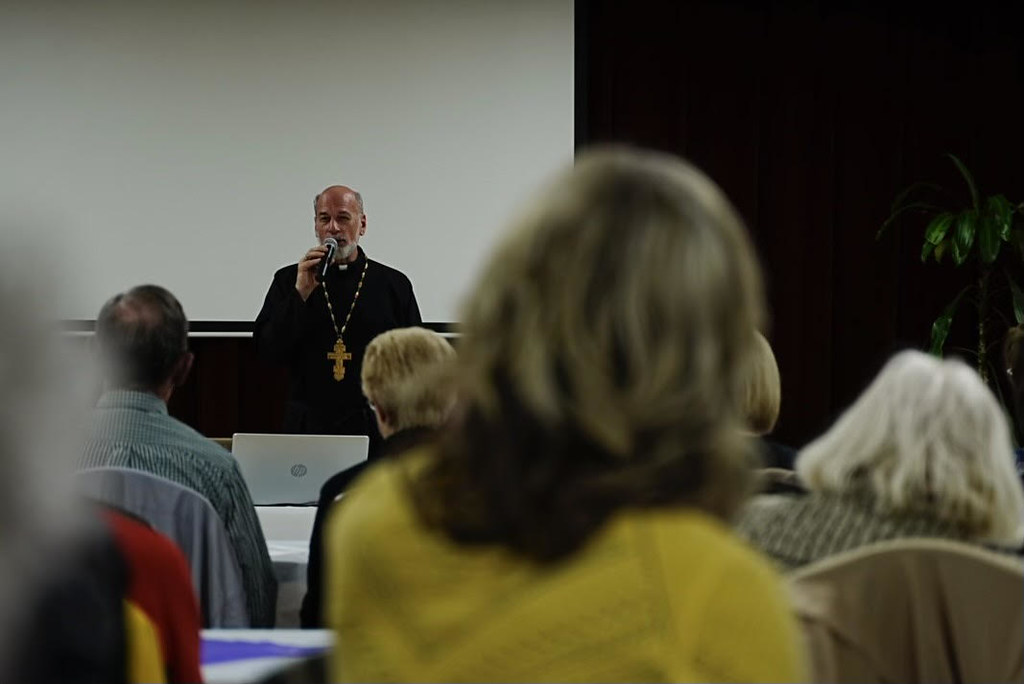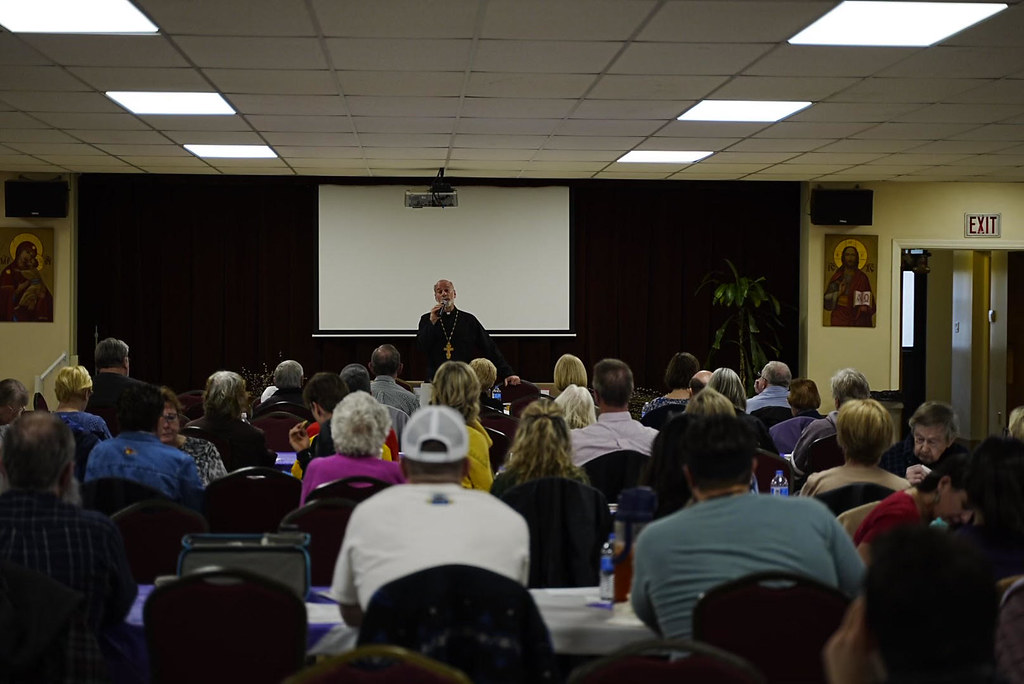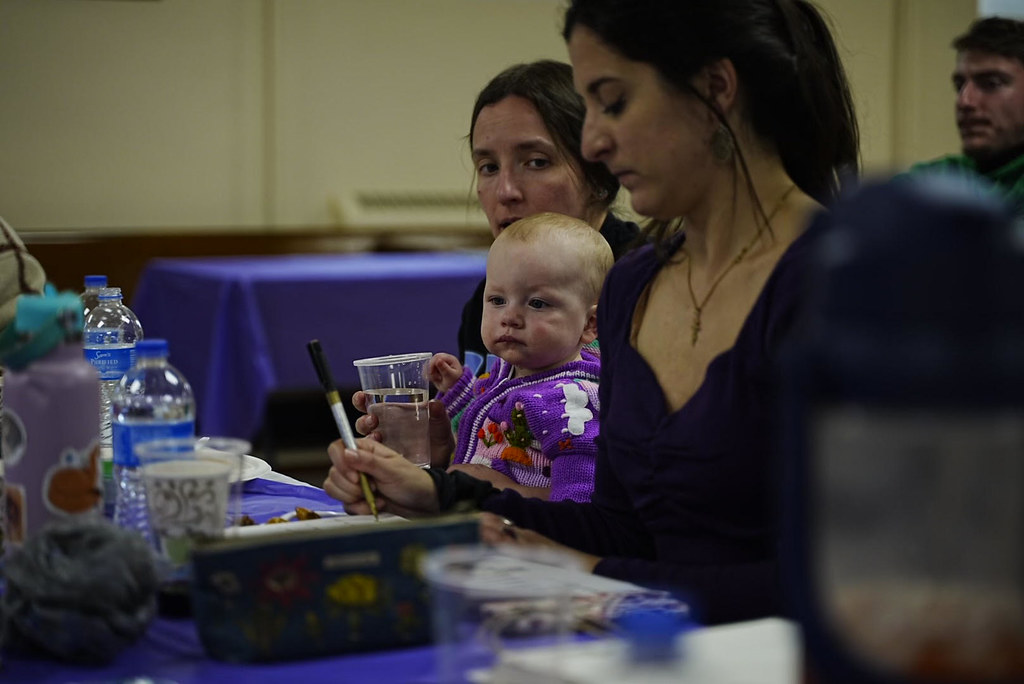Diocesan Photo Gallery
Photo Galleries of the Various Institutions and Ministries of the Diocese
Home » Photo Gallery »
Cathedral Lecture on Melchizedek (3/26/24)
Christ the Saviour Cathedral in Johnstown, Pa. held its second Dinner and Discussion event on March 26, 2024. The topic for discussion centered on the mysterious Melchizedek, King of Righteousness, who first appeared to Abraham as written in the Book of Genesis. The event drew a crowd of over 65 attendees to the Cathedral Auditorium and 24 via Zoom.
Parishioners brought numerous Lenten dishes for the event, which drew many Orthodox and non-Orthodox people from within and outside the parish. Fr. Bob Buczak, Dean of the Cathedral, passed out icon prints of Melchizedek and gave a talk about whether this Biblical figure was “Man, Myth, or Son of God?”
During the talk, Fr. Bob explained the genealogical lineage leading to Jesus Christ, the development of the Levitical priesthood, and the eventual fading away of the Old Testament priesthood with the coming of Jesus Christ, the Great High Priest according to the order of Melchizedek, which is our modern-day priesthood.
Fr. Bob started at the very beginning: “Because Adam and Eve were in full communion with God, they did not have to offer sacrifices,” he explained. “After the fall, their sons, Cain and Abel began offering sacrifices in order to reconcile themselves to God and ask forgiveness for their sins.”
After the Tower of Babel incident, 70 nations began worshiping idols and making sacrifices to false gods, Fr. Bob explained.
“Abraham knew that these gods were empty and false. He yearned to know the True God. God called Abrahan out from his father’s house to a promised land. Abraham’s nephew Lot moved to the city of Sodom, and four kings conquered his tribe. Abraham went to rescue Lot, and when he came back, a mysterious figure appeared riding on a camel,” Fr. Bob said. “This figure did not wait for Abraham to offer a sacrifice — instead, he offered Abraham bread and wine.”
The mysterious man was Melchizedek: King of Salem, or King of Righteousness. “Abraham recognized Melchizedek’s greatness, and offered him tithings,” Fr. Bob said.
Fr. Bob went on to explain that God promised Abraham he would be the father to many nations. Abraham gave birth to Isaac, who had a son, Jacob. Jacob wrestled with the Word of God, and changed his name from Jacob to Israel. Jacob had 12 sons, who became the 12 tribes of Israel.
“When the tribes left Egypt [after their enslavement], led by Moses back to the “Promised Land,” they set up a place of worship,” Fr. Bob said. “All of the tribes had land, except for the tribe of Levi. The sons of Levi became the priests of the temple, according to the Levitical Priesthood of Aaron. They were the priests who offered the sacrifices to God. Other tribes brought the Levites things to sacrifice…wheat, doves, sheep.”
When Christ came, He hosted the Mystical Supper, where He offered bread and wine to His disciples before His crucifixion. “The Old Covenant of the Levitical Priesthood was finished,” Fr. Bob said. “In St. Paul’s book of Hebrews, he explains that a new priesthood was established according to the Order of Melchizedek — a priesthood in which there is no need to sacrifice an animal, as Christ is the final lamb to be sacrificed.”
The Book of Hebrews describes the change from the Levitical worship to the heavenly worship that Jesus established and fulfilled, Fr. Bob said. This started at the Mystical Supper.
Melchizedek, he explained, appeared with no record of a genealogy or ancestral line — no record of his mother, father, birth, or death. “In the past, if someone did not descend from Levi, they could not be a priest,” Fr. Bob continued. “But Melchizedek has no known lineage — no mother, no father. Because Jesus’ priesthood is not earthly, it doesn’t come from the tribe of Levi. Jesus descended from the tribe of Judah. In the priesthood of Melchizedek, a priest is a priest forever.”
Melchizedek appears to transcend earthliness, which makes him a type of Christ. Christ transcends early existence as the eternal King-Priest.
Fr. Bob explained how in the past, one goat was sacrificed, and another would be sent into the wilderness for the sins of the people, where beasts would destroy it. This is where the term “scapegoat” comes from.
“Under the order of Melchizedek, Christ is the final lamb — he became the scapegoat who died for our sins,” he explained. “Christ appointed disciples who appointed priests, creating a Royal,
not earthly, priesthood.”
Whereas in the past, sacrifices could only be made at the Jewish temple in Jerusalem, Fr. Bob explained, it was St. Ignatius who said the church is “catholic” — “meaning, the fullness of the
church is present everywhere, and a sacrifice can be given at any place on earth where there is a bishop,” he said. The word “catholic” comes from the Greek word katholikos, which means “all-encompassing.”
“The church, no matter where in the world it is, lacks nothing. It has the fullness of the Church,” Fr. Bob said.
At the end of the event, Fr. Bob took questions, and parishioners socialized while cleaning up dinner. Fr. Bob said he hopes to plan more events for people to socialize and deepen their understanding of the faith.
By Julie Mastrine
Parishioners brought numerous Lenten dishes for the event, which drew many Orthodox and non-Orthodox people from within and outside the parish. Fr. Bob Buczak, Dean of the Cathedral, passed out icon prints of Melchizedek and gave a talk about whether this Biblical figure was “Man, Myth, or Son of God?”
During the talk, Fr. Bob explained the genealogical lineage leading to Jesus Christ, the development of the Levitical priesthood, and the eventual fading away of the Old Testament priesthood with the coming of Jesus Christ, the Great High Priest according to the order of Melchizedek, which is our modern-day priesthood.
Fr. Bob started at the very beginning: “Because Adam and Eve were in full communion with God, they did not have to offer sacrifices,” he explained. “After the fall, their sons, Cain and Abel began offering sacrifices in order to reconcile themselves to God and ask forgiveness for their sins.”
After the Tower of Babel incident, 70 nations began worshiping idols and making sacrifices to false gods, Fr. Bob explained.
“Abraham knew that these gods were empty and false. He yearned to know the True God. God called Abrahan out from his father’s house to a promised land. Abraham’s nephew Lot moved to the city of Sodom, and four kings conquered his tribe. Abraham went to rescue Lot, and when he came back, a mysterious figure appeared riding on a camel,” Fr. Bob said. “This figure did not wait for Abraham to offer a sacrifice — instead, he offered Abraham bread and wine.”
The mysterious man was Melchizedek: King of Salem, or King of Righteousness. “Abraham recognized Melchizedek’s greatness, and offered him tithings,” Fr. Bob said.
Fr. Bob went on to explain that God promised Abraham he would be the father to many nations. Abraham gave birth to Isaac, who had a son, Jacob. Jacob wrestled with the Word of God, and changed his name from Jacob to Israel. Jacob had 12 sons, who became the 12 tribes of Israel.
“When the tribes left Egypt [after their enslavement], led by Moses back to the “Promised Land,” they set up a place of worship,” Fr. Bob said. “All of the tribes had land, except for the tribe of Levi. The sons of Levi became the priests of the temple, according to the Levitical Priesthood of Aaron. They were the priests who offered the sacrifices to God. Other tribes brought the Levites things to sacrifice…wheat, doves, sheep.”
When Christ came, He hosted the Mystical Supper, where He offered bread and wine to His disciples before His crucifixion. “The Old Covenant of the Levitical Priesthood was finished,” Fr. Bob said. “In St. Paul’s book of Hebrews, he explains that a new priesthood was established according to the Order of Melchizedek — a priesthood in which there is no need to sacrifice an animal, as Christ is the final lamb to be sacrificed.”
The Book of Hebrews describes the change from the Levitical worship to the heavenly worship that Jesus established and fulfilled, Fr. Bob said. This started at the Mystical Supper.
Melchizedek, he explained, appeared with no record of a genealogy or ancestral line — no record of his mother, father, birth, or death. “In the past, if someone did not descend from Levi, they could not be a priest,” Fr. Bob continued. “But Melchizedek has no known lineage — no mother, no father. Because Jesus’ priesthood is not earthly, it doesn’t come from the tribe of Levi. Jesus descended from the tribe of Judah. In the priesthood of Melchizedek, a priest is a priest forever.”
Melchizedek appears to transcend earthliness, which makes him a type of Christ. Christ transcends early existence as the eternal King-Priest.
Fr. Bob explained how in the past, one goat was sacrificed, and another would be sent into the wilderness for the sins of the people, where beasts would destroy it. This is where the term “scapegoat” comes from.
“Under the order of Melchizedek, Christ is the final lamb — he became the scapegoat who died for our sins,” he explained. “Christ appointed disciples who appointed priests, creating a Royal,
not earthly, priesthood.”
Whereas in the past, sacrifices could only be made at the Jewish temple in Jerusalem, Fr. Bob explained, it was St. Ignatius who said the church is “catholic” — “meaning, the fullness of the
church is present everywhere, and a sacrifice can be given at any place on earth where there is a bishop,” he said. The word “catholic” comes from the Greek word katholikos, which means “all-encompassing.”
“The church, no matter where in the world it is, lacks nothing. It has the fullness of the Church,” Fr. Bob said.
At the end of the event, Fr. Bob took questions, and parishioners socialized while cleaning up dinner. Fr. Bob said he hopes to plan more events for people to socialize and deepen their understanding of the faith.
By Julie Mastrine






